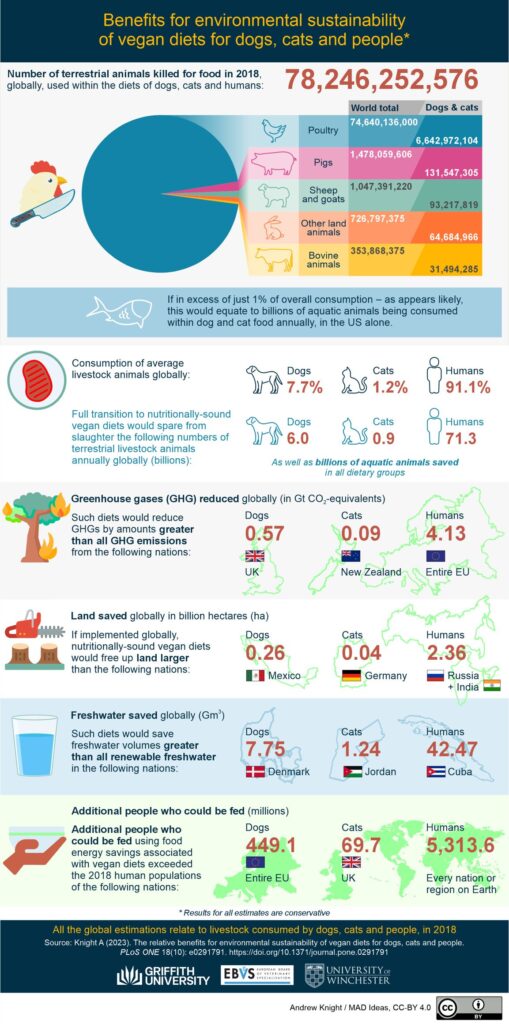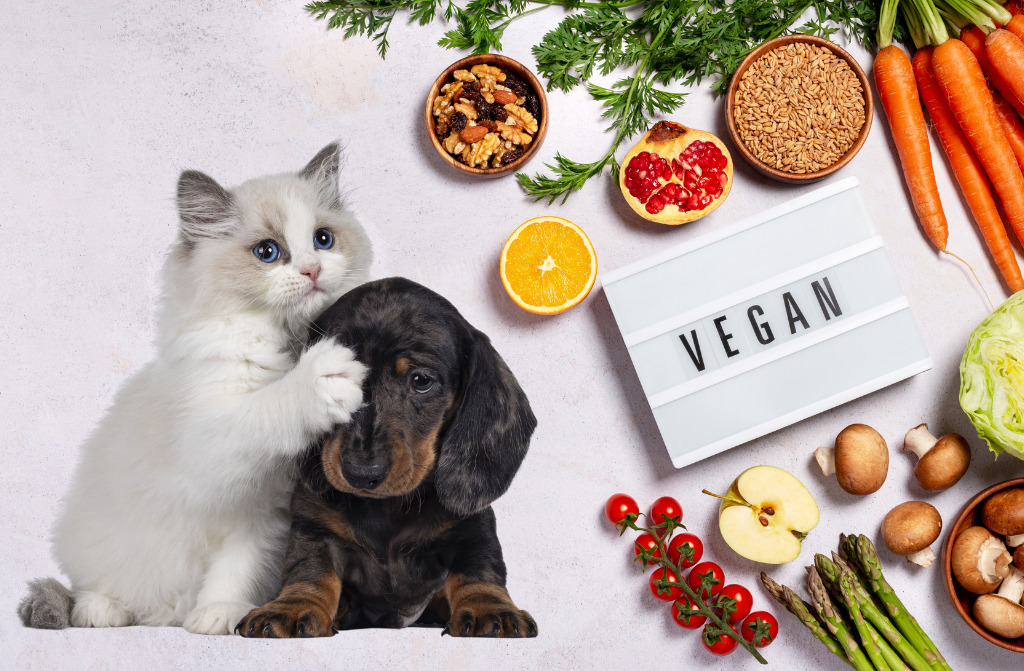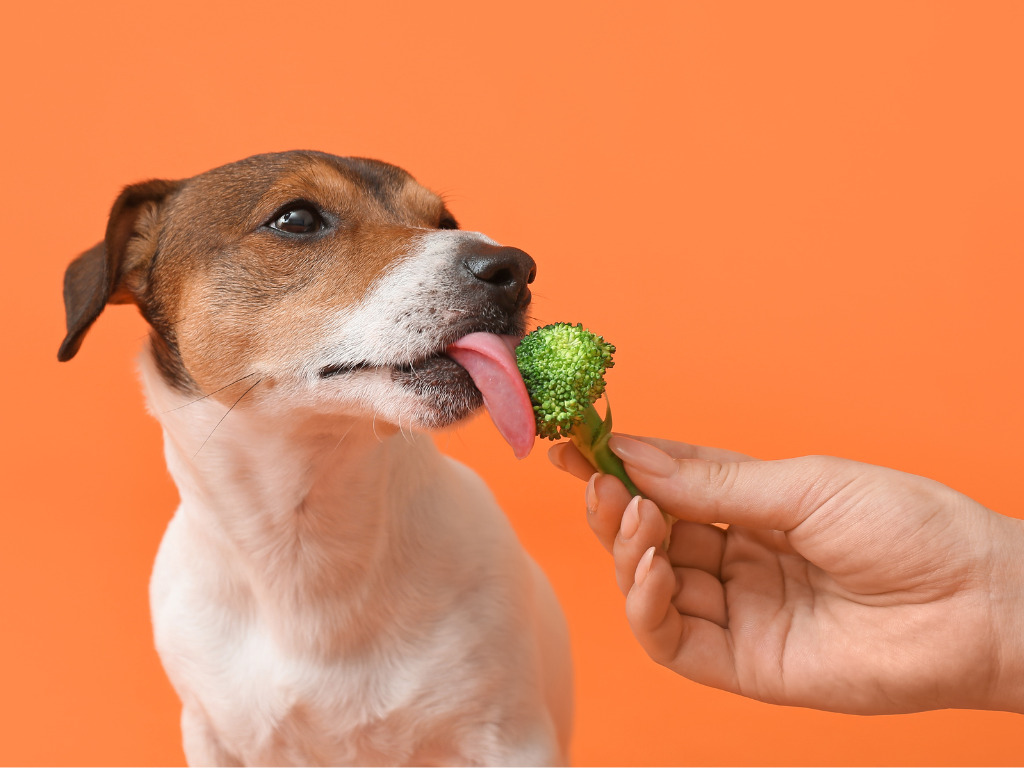6 Mins Read
A new peer-reviewed study has found that if the world’s dogs and cats went vegan, it could have tremendous benefits for the climate and global food security. It would help feed nearly 520 million people, conserve land the size of multiple countries, and also save billions of animals from slaughter.
If all dogs were put on a nutritionally complete vegan diet, it would help feed nearly 450 million people, which is higher than the entire EU population. For cats, this would equate to almost 70 million, more than the populations of France or the UK. Doing so would also help save more greenhouse gas emissions produced by the UK or South Africa (for dogs), or Israel or New Zealand (for cats).
These are the results of research led by the University of Winchester’s Professor Andrew Knight, who has previously published a series of studies about the impact of plant-based diets on pet health. This latest analysis – published in the journal Plos One – found that dogs and cats consume about 9% of all land animals slaughtered for food – that’s nearly seven billion per year. And this isn’t counting aquatic species like fish, which would be much higher (this is harder to calculate as data is provided in terms of weight of seafood, not the absolute numbers of animals).

Given that meat has a much higher climate, land use and water footprint than plant-based food, if all dogs in the world went vegan, it would free up land larger than the size of Saudi Arabia or Mexico (the 12th- and 13th-largest countries by area, respectively) and save more freshwater than all renewable freshwater in Denmark. For cats, this would mean more land than Japan or Germany, and saving more water than available in Jordan.
The research also calculated the impact of humans transitioning to a plant-based diet. If that were to happen, it would feed 5.3 billion people – about two-thirds of the world’s population. It would also save more greenhouse gas emissions than emitted by India or the entire EU, more renewable water than available in Cuba, and more land than the area of Russia and India combined (the largest and seventh-largest countries in the world).
The environmental impact of pet food
The calculated figures are staggering, and show the potential impact a vegan diet could have on climate change, water scarcity and food insecurity. And the researchers say all these estimates are conservative. “I think that the true environmental impacts of dog food are actually larger than those found in my results; probably substantially larger,” Knight told UK vegan dog food startup The Pack in a blog post published on the brand’s website. “Conversely, the benefits of transitioning them on to nutritionally-sound vegan diets, are probably much greater than shown in my study – which already shows very large benefits.”
According to the research, when considering the total number of dogs and cats that could alternatively be fed using the food energy savings from a vegan transition amounts to between 150-190% of the entire global dog and cat population (as of 2018).
“Pet owners who care about the environment or their animals’ health should consider nutritionally sound vegan pet food,” said Knight, who called the study “game-changing”. “We’ve long known that plant-based diets are better for the planet, but have not seriously considered the impacts of pet food.”

He added: “However, pet food has profound environmental impacts.” In the US alone, for example, producing dry cat and dog food equates to between 25-30% of all emissions related to animal consumption by Americans. And globally, dog and cat food emit around 64 million tons of carbon per year – that’s the equivalent of over 13 million cars.
“There have been many calls for human diet change, but virtually no calls for diet change for dogs or cats. This is partly because of the assumption that they consume relatively few livestock products and that what they do consume is mainly by-products of human food production and is therefore beneficial ‘recycling’,” Knight told The Pack.
“But actually, what this study shows is that the only benefit of using byproducts within meat-based pet foods is that they’re cheaper than human-grade meat. The actual environmental impact of using by-products is greater than if pets were to be fed human-grade meat. This is because using byproducts requires more livestock animals to produce, than producing human-grade meat. It’s less efficient on a per-carcass basis.”
Health benefits and increased brand presence
In a statement, Knight added: “Large-scale studies have also shown that health outcomes for both dogs and cats are as good or better. And studies of feeding behaviour have demonstrated that average dogs and cats enjoy vegan pet foods as much as those made from meat.”
Last month, he co-authored a large-scale peer-reviewed study revealing that cats on a vegan diet could be healthier than those on a meat-based one, challenging the notion of felines being obligate carnivores. It followed research published last year by Knight and other researchers that found that vegan diets are the healthiest and least hazardous choice for dogs.
The British Veterinary Association, which previously discouraged consumers from feeding their pets alternative protein, is now reviewing its advice. Moreover, in February, the industry body UK Pet Food published new guidelines that acknowledged animal-derived nutrients can be sourced synthetically or from novel ingredients, so long as they are carefully formulated by highly qualified pet nutritionists. “There is little evidence of adverse effects arising in dogs and cats on vegan diets,” it stated.

It coincides with the growing interest in feeding future-facing food to our furry friends. The vegan dog food market, for example, is valued at £11.5bn in 2023, and projected to reach £21bn by 2033, the Guardian reports. Plant-based dog food is already an established category, with brands like Wild Earth, Omni and The Pack being some of the most popular ones (Wild Earth also makes cell-cultured dog food).
While vegan cat food is still much more niche, an increasing number of brands are working with plant-based or cultivated meat for cats, like BioCraft Pet Nutrition (formerly Because Animals), Bond Pet Food, and Marina Cat.
“Change is happening, but it’s not going to take place overnight, where all the supermarkets suddenly have good availability of these brands,” Knight told the Pack. “In fact, I’m hearing of shortages of vegan pet food in various regions of the world, and we know that consumer convenience is a key factor in determining whether products like these succeed. It’s therefore really important that this is addressed.
“I think we’re seeing the teething problems that occur when a disruptive industry first emerges, and new products become available. There’s always a period when demand outpaces supply, and supply needs to catch up. We’re going through that at the moment with vegan pet food.”




